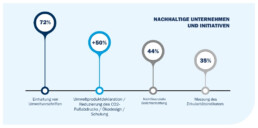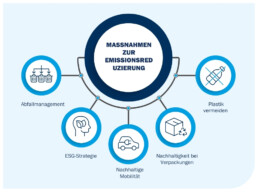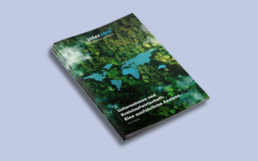White Paper - Companies and the Circular Economy: A Detailed Analysis
Sustainable development should not only be pursued because of social responsibility, but is also the key to the long-term success of companies. In times of climate crisis and growing expectations from customers and stakeholders, companies must take active measures to reduce their impact on the environment. The transformation to a circular economy is inevitable, but requires the cooperation of all societal actors. The aim is to secure economic benefits in addition to social and ecological ones: cost savings, improved corporate reputation and long-term competitiveness.
Did you know that...?
…. the vast majority of companies want to implement sustainable initiatives or have already started doing so? This was reported by between 71.1 and 84.9% of managers of medium and large companies from 6 European countries.
The increasing public awareness of lifestyle and consumption patterns means that companies, institutions and authorities are recognizing the need for an inevitable change in direction of strategies and economic activity.
ONLY 4% OF COMPANIES WILL NOT INVEST IN SUSTAINABILITY
More than 4 out of 10 companies (41.8% of managers participating in the Interzero study) plan to invest up to 150,000 euros in sustainability over the next three years (23.9% up to 50,000 and 17.9% up to 150,000 euros). More than half ( 53.9% ) will spend more than 150,000 euros and more than 2 out of 10 (24%) plan to invest more than 500,000 euros .
What motivates companies to invest in sustainable initiatives?

Process efficiency is the most important driver for implementing sustainable initiatives, followed by reasons of communication and reputation management towards stakeholders. Regarding the reasons mentioned, the analysis shows that compliance with environmental regulations is the most widespread practice (72% of companies).
How do companies minimize their environmental impact?
Reducing environmental impact by switching to production systems with minimal environmental impact strengthens competitiveness. To achieve this goal, measures such as reducing emissions, improving waste management, developing an effective ESG strategy, avoiding plastic and producing and using sustainable products and packaging are taken.

Interzero Analysis: Status, Needs and Trends in the Circular Economy
Interzero supports companies in adapting to sustainable business models through comprehensive consulting and innovative environmental solutions. Our white paper presents the results of a study on sustainability trends, market expectations and related business decisions of medium and large companies in Europe . Six countries were analyzed: Italy, Austria, Poland, Slovenia, Croatia and Serbia.
The aim of the study was:
- Understanding and analyzing market trends in the field of circular economy and sustainable development
- Investigation of possible obstacles to the effective reduction of environmental pollution
- Investigation of the key sustainability needs of medium and large companies in the countries studied and analysis of their willingness to introduce sustainable business models
- Creating a basis for the state of development of the green transition in business models at European level by summarising the data from all the countries analysed

Please fill out the form to access the white paper results:
Do you have questions about the white paper? Do you need help developing a sustainability strategy for your company?
Write to us at the email address below!
